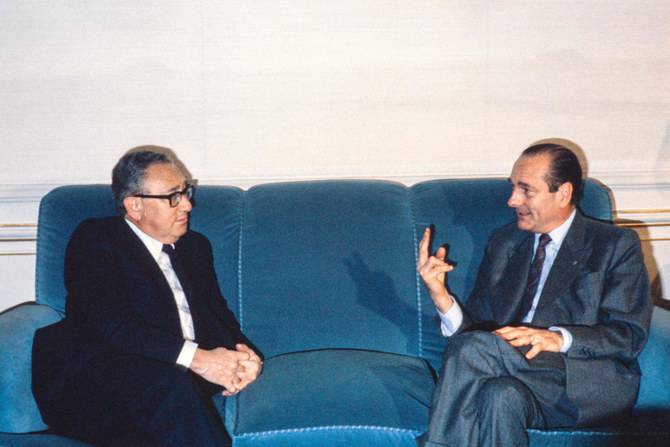LONDON: Anwar Sadat, Mao Zedong, Richard Nixon, and King Faisal are some of the leaders who defined the 20th century. What their stories and legacies have in common is the impact of the efforts of one diminutive but nevertheless immensely consequential figure: Henry Kissinger. German, American, soldier, intelligence officer, Harvard academic, statesman and businessman rolled into one, this geopolitical oracle turns 100 on May 27.
Revered by many and loathed by some, Kissinger came to personify American power at its peak, casting the long shadow of Pax Americana across the world, at times advocating US values and, at other times, snuffing out revolutionary movements and propping up military juntas.
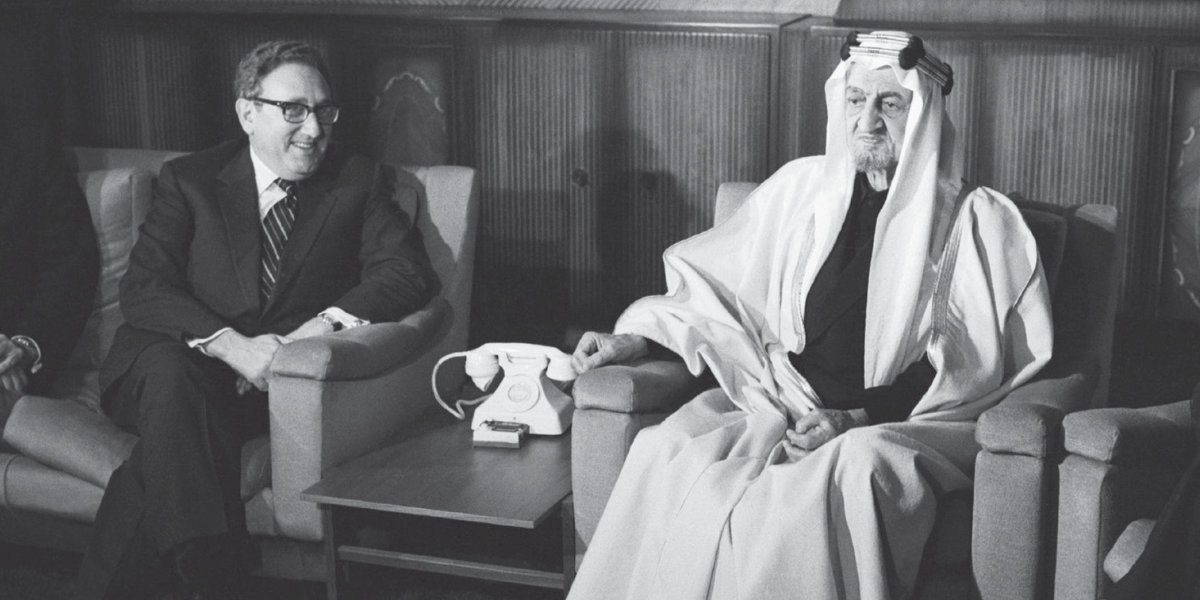
US Secretary of State Henry Kissinger with meeting with Saudi Arabia's King Faisal in 1973 in Riyadh. (AFP)
Any article would struggle to summarize such a long and eventful life. Born five years after the abdication of Germany’s last emperor, Kissinger’s own archive material is estimated to consist of 30 tons of documents.
Though he became synonymous with Cold War America, the instantly recognizable Bavarian traces to his gravelly voice gave away his origins. Born to German-Jewish parents on the outskirts of Nuremberg, the young Kissinger displayed an audacity that would later come to embody his swagger on the international stage, as he defied local Nazis to attend football matches and rebelled at their restrictions.
His real mettle, however, began to show when, as a refugee in America in the 1930s, he attended school at night and worked in a shaving-brush factory during the day.
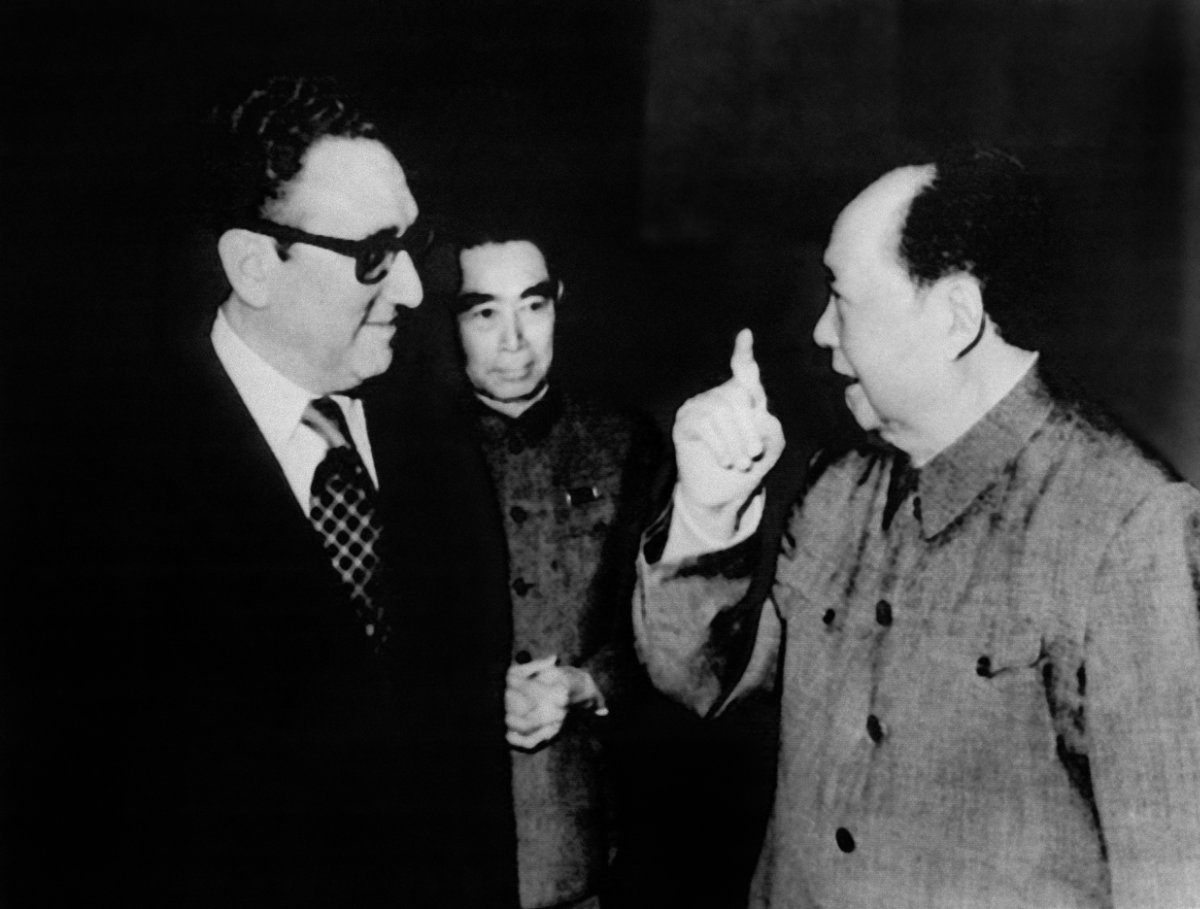
US Secretary of State Henry Kissinger meeting with China's Chairman Mao Zedong in Beijing on February 17, 1973. (AFP file)
Continuing to work through his senior studies, Kissinger saw his education cut short by the onset of the Second World War. Seeing action at the Battle of the Bulge, his wartime service culminated with the administration and denazification of liberated German sectors under his control.
Kissinger’s enthusiasm for his adopted country was to grow; he later recalled that the experience made the uprooted young man “feel like an American.”
Kissinger’s career is often looked at in detail following his appointment as the US national security adviser in 1969. However, his post-war years as an academic laid the foundation for his later association with, and application, of realpolitik.
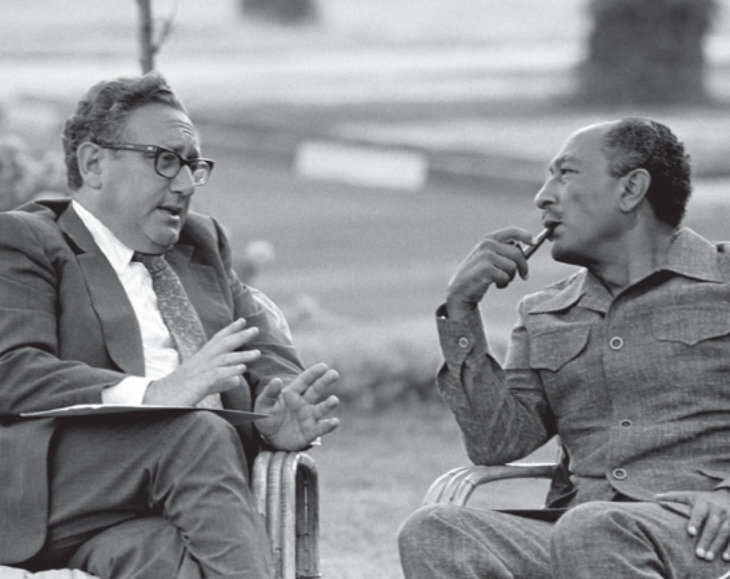
US Secretary of State Henry Kissinger with Egyptian President Anwar Sadat in Cairo in May 1974. (AFP)
Kissinger’s worldview, or weltanschauung, has been typified by sound bites such as “America has no permanent friends or enemies, only permanent interests.” This particular understanding of the world through the prism of empires and great power politics is founded in a 19th century understanding of the world.
It is therefore unsurprising that his Harvard doctoral dissertation was titled “Peace, Legitimacy and the Equilibrium (A Study of the Statesmanship of Castlereagh and Metternich).”
This academic study of the period between 1815 and 1914 is known as the Concert of Europe, when the Great Powers sought to maintain a certain balance of power and supported world peace. Notable for figures like Otto von Bismarck whose political philosophy is frequently inseparable from his own, it is this period that Kissinger sought to mirror, replacing the historical role of Great Britain with the unparalleled superpower of 20th century America.
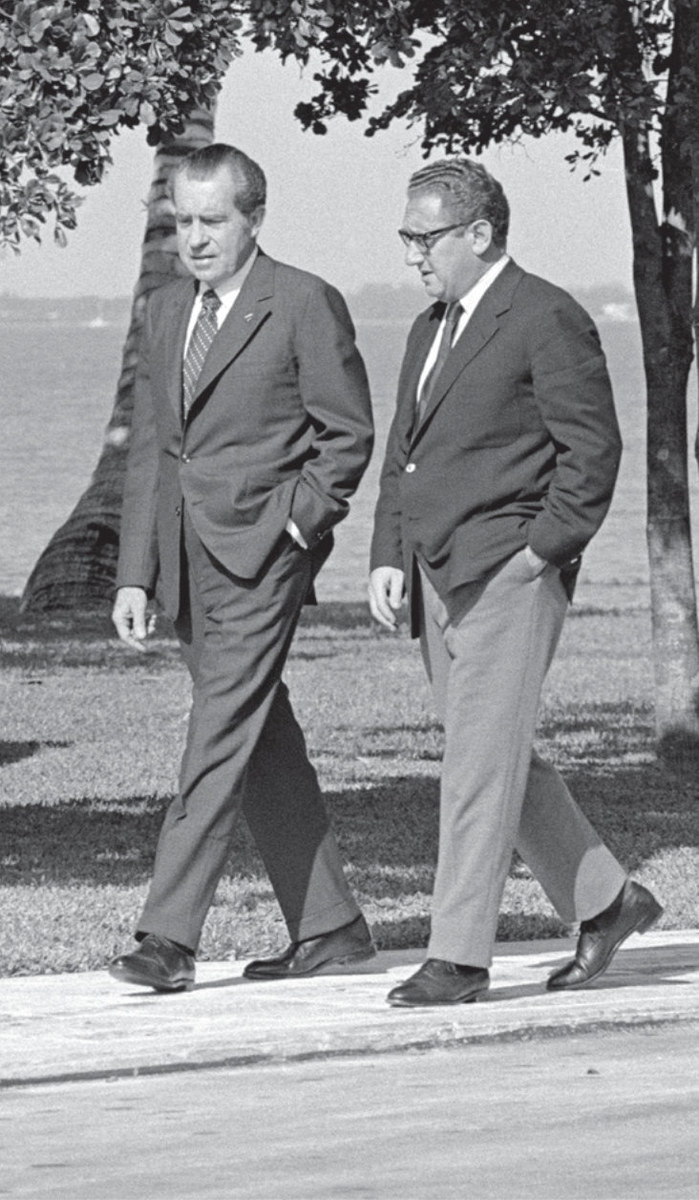
Henry Kissinger and US President Richard Nixon in 1973. (AFP)
As Kissinger became known to power brokers in Washington, his move toward a political career was inevitable. Unlike his peers, his solid academic foundation furnished him with an ability to act as in-house counsel on the political challenges of the day.
If the jet engine came to symbolize US military and cultural dominance in the post-war era, Kissinger employed international travel to the same effect to overhaul American diplomacy. His appointment to secretary of state in 1973 was in many ways merely the formal ratification of an increasingly international role he had been playing.
That year saw Kissinger at the forefront of efforts at shuttle diplomacy to reshape the world to advance American interests. Having already paved the way for the groundbreaking 1972 summit between Nixon, Zhou Enlai and Chairman Mao, Kissinger brought China in from the cold, leading to the formalization of relations between the two countries, and crucially brokered an anti-Soviet entente between the two powers.
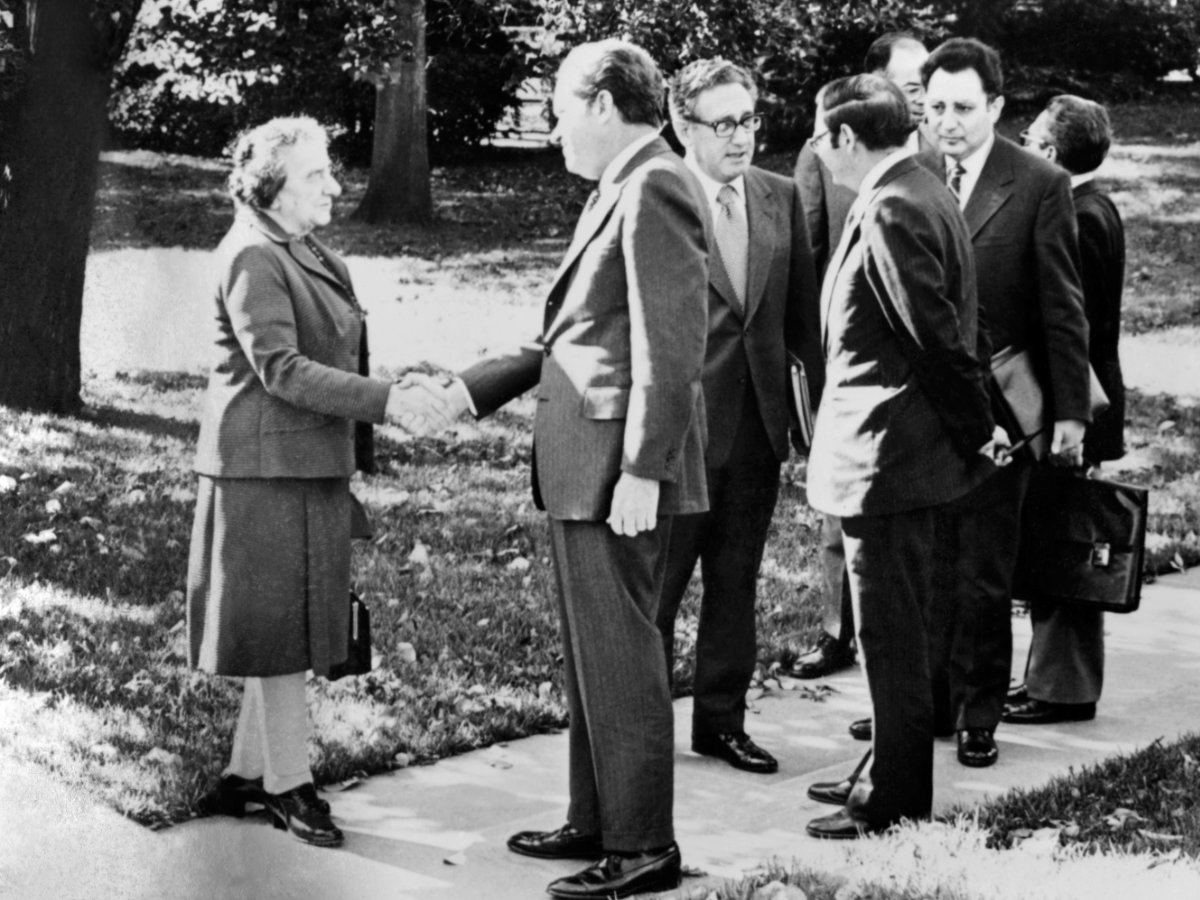
As US President Richard Nixon (2nd left) meets with Israeli Prime Minister Golda Meir, Henry Kissinger (3rd left) deals with other Israeli officials in Washington on November 1, 1973. (AFP)
As the world looked on following the Yom Kippur War, Kissinger, directly following his involvement in a coup in Chile the previous month, shuttled between Arab capitals while also organizing an unprecedented airlift of weapons to Israel, tipping the regional balance of power to the point that Israel has never faced an Arab invasion since.
With the year culminating in a pact to end the Vietnam war, Kissinger’s hyper-diplomacy was recognized with a Nobel Peace Prize, his international activities becoming a blueprint for American diplomacy to his peers and a stain on his career in the eyes of his detractors.
FAMOUSQUOTES
You can’t make war in the Middle East without Egypt and you can’t make peace without Syria.
Accept everything about yourself — I mean everything, You are you and that is the beginning and the end — no apologies, no regrets.
Ninety percent of the politicians give the other ten percent a bad reputation.
The illegal we do immediately. The unconstitutional takes a little longer.
Power is the ultimate aphrodisiac.
Kissinger is often viewed as having been the unsentimental dispenser of American power in the developing world. Though he succeeded in pursuing its interests, his zero-sum worldview — of a vast global jigsaw puzzle consisting of pieces that needed to be moved to fit America’s emergence as the world’s supreme power — did cause controversy.
Having once stated that “I am not interested in, nor do I know anything about, the southern portion of the world” and “What happens in the south is of no importance,” it is now clear that a certain ignorance of the wider world underpinned the more decisive political and military interventions which he supported to extend America’s reach.
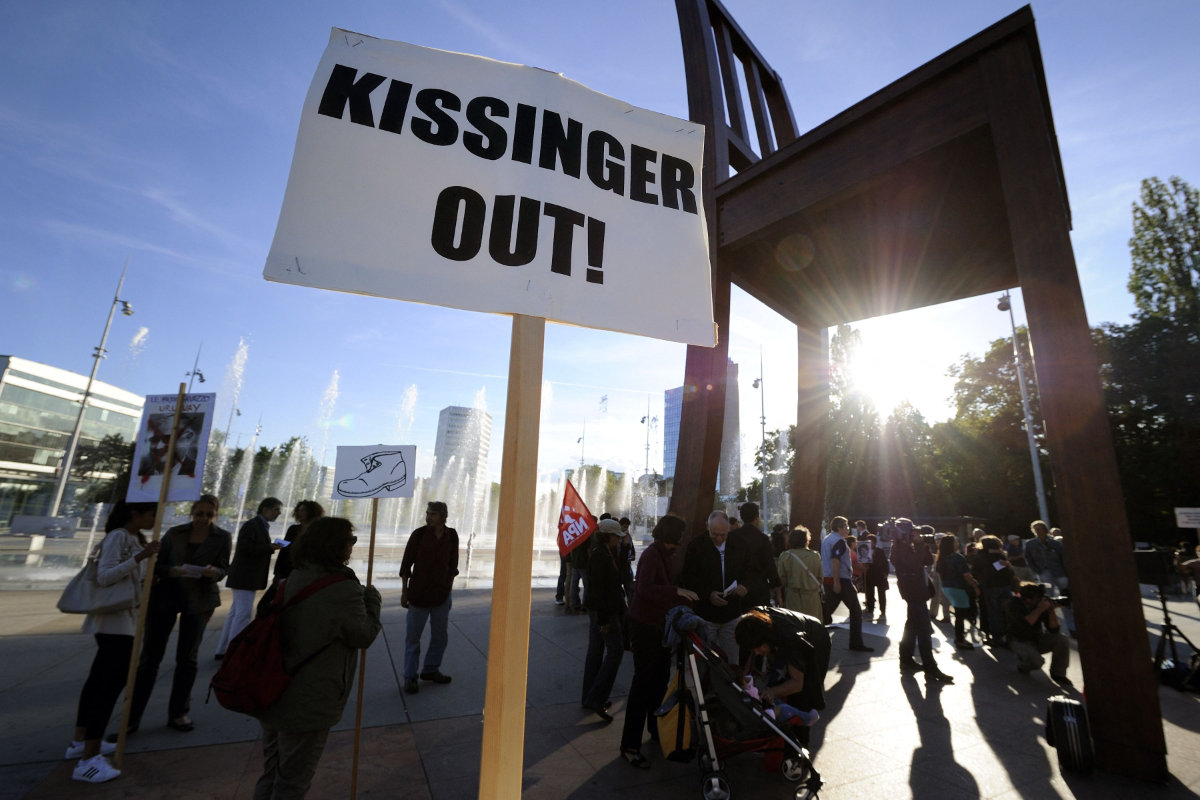
Demonstrators gather at the Place des Nations in Geneva on September 10, 2010 to protest against the presence of former US Secretary of State Henry Kissinger and his alleged role in the 1973 military coup in Chile. (AFP)
His involvement in the Chilean coup, Bangladesh, Pakistan, East Timor and the bombing of Cambodia continue to be subjects of great debate, summarized in the 2001 treatise by Christopher Hitchens, “The Trial of Henry Kissinger.”
Speaking later in life, Kissinger would argue that the bombing of Cambodia was essential to stopping raids into South Vietnam. Truth be told, the focus on the subsequent widespread US bombing of Khmer Rouge is a lot less controversial now compared with the crimes of the Cambodian regime’s own genocide in the 1970s.
Nevertheless, Kissinger’s intercontinental politicking was true to the Bismarckian mold from which he emerged, faintly masked by his use of the first German chancellor’s famous maxim, “politics is the art of the possible.”
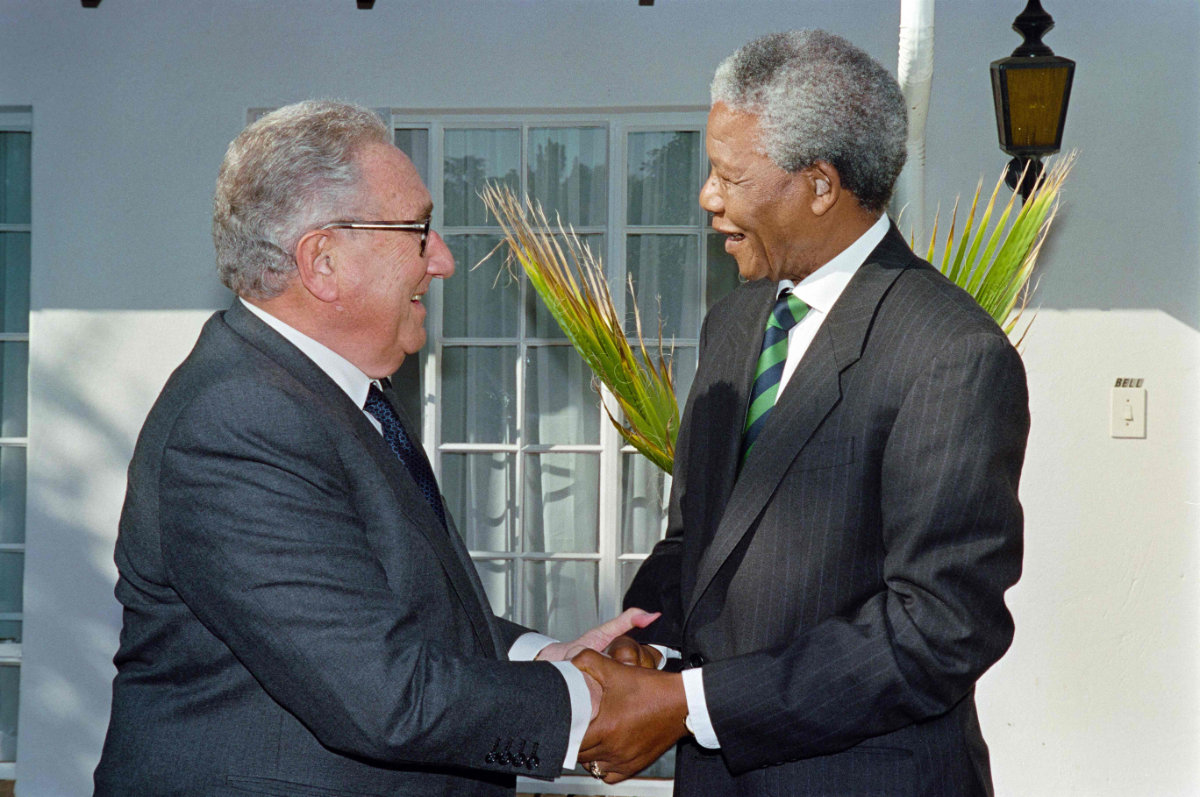
African National Congress President Nelson Mandela (R) greets former US Secretary of State Henry Kissinger upon his arrival for their meeting in Johannesburg, South Africa, on April 13, 1994. (AFP)
When all is said and done, it is still remarkable that Kissinger, a man who retired 50 years ago, has remained politically relevant. Leading Kissinger Associates, he has continued to have remarkable influence and reach, as the global great and good’s consigliere par excellence.
Kissinger’s long political goodbye has given him the opportunity to have the final say on many of the important moments of his career, a luxury not enjoyed by his late peers. His relevance, however, persists, his advocacy of coexistence with China and detente with Russia making his expertise much sought after amid efforts by one to disrupt America and by the other to altogether displace it.
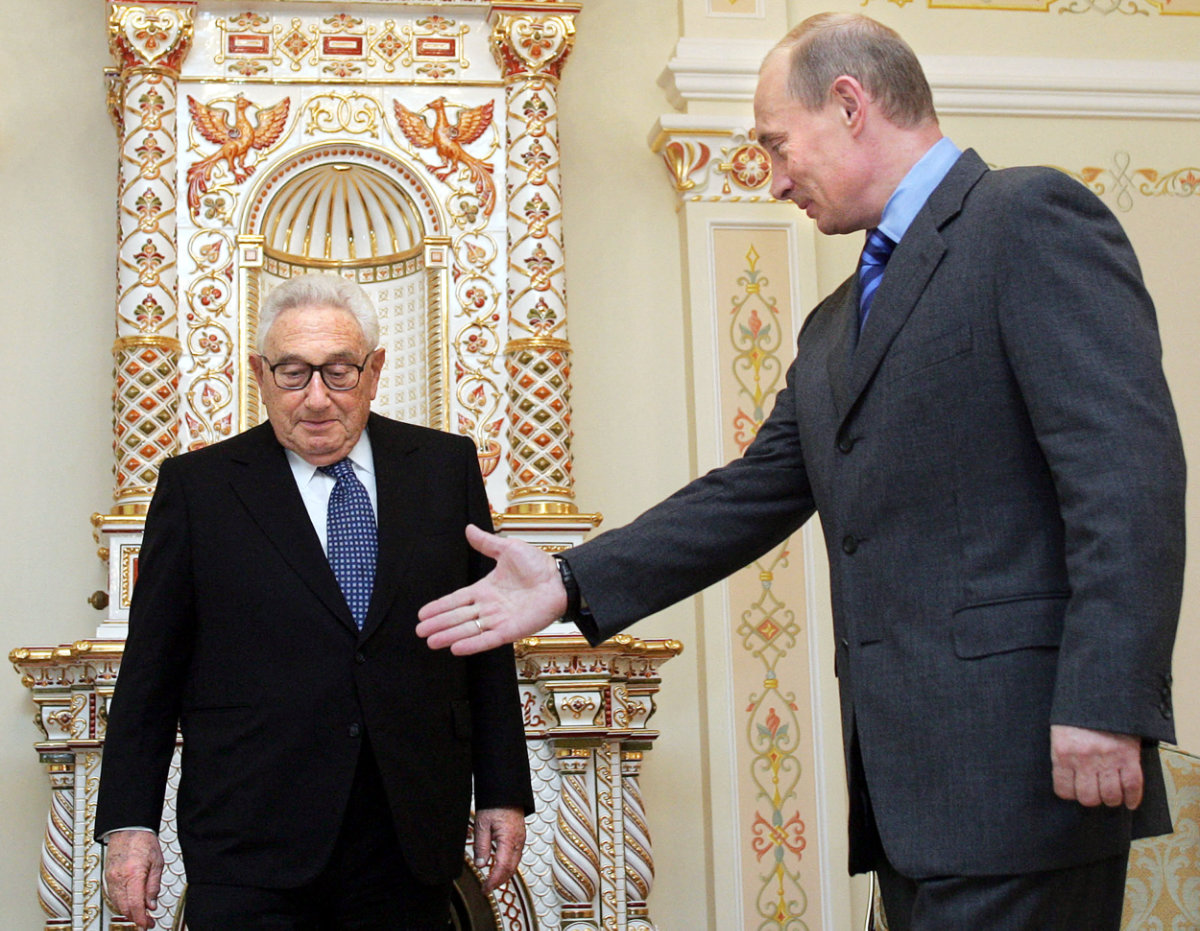
Russian President Vladimir Putin (R) welcomes former US Secretary of State Henry Kissinger during their meeting at the Novo-Ogaryovo residence outside Moscow on June 06, 2006. (AFP)
However, the constant rebalancing of global power is not where Kissinger’s principal interests lie today. He has spent the last decade warning about the rise of artificial intelligence, which threatens to rewrite the diplomatic rulebook, especially for a man who was born at a time when armies still deployed cavalry.
Warning most recently in a book on the issue last year that the AI arms race is a “totally new problem” “with as yet no plausible theories on how states can prevail,” the centenarian continues to turn heads.
There is no doubt that Kissinger, for his many faults, remains a public figure who shaped an era. He is, however, an infinitely more complete character than the scheming master of realpolitik that his critics make him out to be.
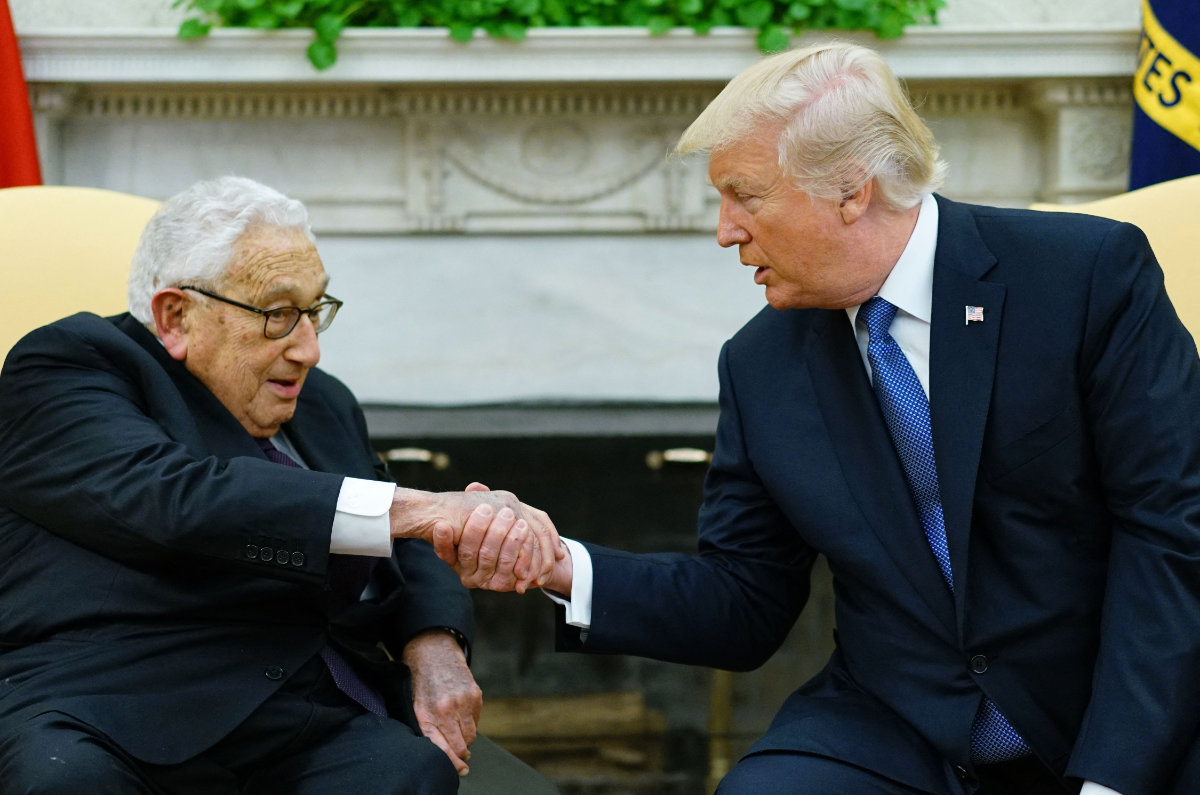
Former Secretary of State Henry Kissinger meeting with US President Donald Trump (R) at the White House in Washington on October 10, 2017. (AFP)
This career of immense achievement and relentless controversy was made possible by a talent who was as brilliantly educated as he was discreet, both qualities that are sadly missing from present-day political life.
It is not unlikely that as just Kissinger plotted the extension of American dominance, as a student of imperial history he also expected to observe its decline. But it is unclear whether this is attributable to the speed with which this has taken place or how long Kissinger has lived. In any case, he probably has the answer.
-------------------------------
• Zaid M. Belbagi is a political commentator, and an adviser to private clients between London and the Gulf Cooperation Council (GCC). Twitter: @Moulay_Zaid






